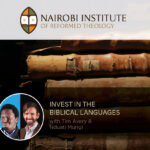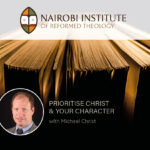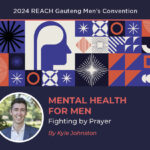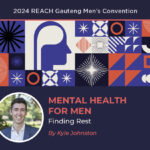It’s not easy to live for Christ in any context. Poet Puno Selesho shares how her faith influences her urban African culture – and how to put Christ first
My Faith vs. My Culture
There is an inevitable tension between our faith and our culture. Even when we are raised in Christian homes or sent to Christian schools we cannot forget that the secular context will permeate our lives. Yet we still have to live our out our faith within this unique environment.
South African poet, Puno Selesho, shares the influences which came together to form her ‘urban African’ culture and how they impact the way she lives out her faith every day.
Does It Align With Christ?
“I think my parents – and even more my grandparents – they had this idea that once you adopt Christianity everything of culture you leave… and it didn’t sit well with me.”
“I think culture is a beautiful thing so I’m going to speak about it generally. It’s a beautiful thing and we should all celebrate all our different cultures. And even though it is mixing and it’s becoming all of these new African-urban situations and all of that. But, still the highest value that I will always align to is having a Christ-like mindset. So, I think in every decision, in every behaviour, in every action in everything that you say, in every practice – whatever it is – it always has to align with Christ. If it doesn’t align with Christ then… you shouldn’t do it!”
“There will always be clashes – whether it’s your culture or your sexuality or the way you do life – whatever. And it is a matter of always trying to bring that in alignment with Christ. Which is a daily fight.”
For a full transcript please click the toggle button below…
#TGCAfricaPodcast #TGCAfrica #Faith #Culture #AfricanChristianity #FaithandCulture
Transcript
Puno: “I think culture is a beautiful thing so I’m going to speak about it generally. It’s a beautiful thing and we should all celebrate all our different cultures. And even though it is mixing and it’s becoming all of these new African-urban situations and all of that. But, still the highest value that I will always align to is having a Christ-like mindset. So, I think in every decision, in every behaviour, in every action in everything that you say, in every practice – whatever it is – it always has to align with Christ. If it doesn’t align with Christ then… you shouldn’t do it!”
in every action in everything that you say, in every practice – whatever it is – it always has to align with Christ. If it doesn’t align with Christ then… you shouldn’t do it!
Blaque: “You are worshiping your culture.”
Puno: “Exactly! Exactly!”
Blaque: “Hello everyone. Welcome back to The Gospel Coalition Africa Podcast. I’m still your host – still here. Different environment because we are trying new things! But I am here obviously with a very good friend and we are going to be speaking about faith and culture! If there is a war, if it’s just a rumour and we are just making it a thing. But before we get into it. Yeah! Please tell us who you are, where you are from, what you are about! What is the crown on your head?”
Puno: “So, my name is Puno. I am from Pretoria. I hail from Pretoria. I am a poet, mainly, I guess. I am… what else do you say at this part of the situation…?”
Blaque: “What keeps you busy during the day? Are you writing poetry every hour?”
Puno: “I wish hey! That’s the dream – that’s the dream. We wanna be there. No. So I am a B-BBEE consultant by day. And then I am a poet and a general creative by night. That’s what I do.”
Blaque: “Were you born in Pretoria?”
Puno: “Yes. Born and bred from the beginning until now. Yeah and I am 24. So I am like youngish. Yah – decently young.”
Blaque: “You are mature. Like your parents kicked you out of their medical aid.”
Puno: “Yes – that’s it guys. Get a medical aid!”
Blaque: “Speaking of medical aid… like medical aids can save your body, but your soul was saved by Jesus?”
Puno: “Definitely. 120%”
Blaque: “When did you meet Him? How did you meet Him?”
Puno: “Yoh. So, mine is that classic cast of ‘oh I grew up in a Christian family’. And then you kind of like… I think I probably gave my heart to the Lord like 40 times, just in case! Because I was like – I don’t know is it that? I’m not sure! Which was hilarious. But I think… I went to a Christian school – a Christian high school. So, I can’t remember the year. I can’t even remember the date. But I know there was a specific like chapel service where I had a chat with Jesus and it felt real. It felt like, you know what, I really actually do wanna do life with you. Whatever that means. So I am gonna say about grade 9, 2009 – that is the official time.”
Blaque: “Well, I mean, sure – you go to a Christian school but we know that all of you are a bunch of sinners.”
Puno: “Div-ha 100%!”
Blaque: “So, did relationships change? Did the way you interacted with other people change at school particularly? Did people think “yo, man. We go to a Christian school but we are not taking the stuff that seriously! What are you doing?” Did it happen like that? Or were you just like “yo, man we are Christian. Kumbaye. You were like singing and playing like ukuleles during break..?
the Christian school environment… did become a bit of an achievement thing. People who felt like they couldn’t fit into the usual Christian box, I think they struggled
Puno: “Um… the Christian school environment is interesting because I think there’s a lot of people who get quite disillusioned by Christianity in that space. Because we all assume we are on the same page and… we like… we had… I mean we had a subject called discipleship! Like you can pass discipleship. The award you get is for love, joy, peace, kindness in the holy spirit. So, I think it did become a bit of an achievement thing and those who were good enough and not good enough. Then people who felt like they couldn’t fit into the usual Christian box, I think they struggled a bit. I personally, I think, from that, for instance, that grade 9 moment, I started almost internalising the relationship. So yes, I’m like, cool – there’s this outside, sort of, markers of ‘achieve this’ or ‘be like this’. I mean, there was a prize for um… most outstanding Christian character and most improved Christian character. I’m like, how do you even measure that? So, I think I started then questioning. Because I’m quite a questioner. In the sense of like, it needs to hit home with me. So I am actually grateful for that.”
Blaque: “And your definitions of what culture and faith are… I just wanted us to pause and just zoom into both of them. Particularly from your experience. So you grew up in Pretoria and I grew up in the hood. In Thembisa. For those who don’t know what a township is… it’s a predominantly black area. If you see a white person… yeah – we freaked out! Um… but… when we hear Pretoria we think Afrikaans people. We think white Afrikaner. That is what we think. And here you are! A black woman who still lives in Pretoria!”
Puno: “Yup!”
Blaque: “So could you please walk us through how you interpreted this giant thing called culture – still interpret it for yourself now living in Pretoria.”
there are so many different things that I have taken and put together to become what I deem my culture. Or my evolving culture.
Puno: “Sjoe. So, I… yah. Born and bred in Pretoria like we said. And in the burbs. So I was actually born in Sunnyside – so in the city, city, city – in the depths. The darkest part of the CBD. But grew up in the burbs. So, not a hood. But a neighbourhood. Yes! But I think there are so many different things that I have taken and put together to become what I deem my culture. Or my evolving culture. So, parents… born in villages. Lived in villages even when they were married and had their first kid. Moved to a township or multiple townships at that point. And then settled in the burbs. So obviously taking from their roots and their heritage and their practices. And even how that’s interacted with their Christianity. Which, I mean, we will discuss as things come out. But, um…”
Blaque: “So, both your parents are… what’s their traditional culture?”
Puno: “So, Dad is a Pedi man. Mum is a Tsonga woman.”
Blaque: “Oh – OK. Those are very strong cultures, yeah!”
Puno: “Absolutely. Very far apart. Even with gender roles. Even as much as there are similarities… there are also differences in how it plays out. There is a beautiful dance that they also have which is amazing. So that informed a lot of what I deemed to be my culture.
In the burbs… it’s not like “Oh, I’m bringing my culture and we are side by side”. Your culture must just be on mute.
Then you’re also in a city which, yes, we can be like “Oh, there’s a lot of black individuals in the city” for instance or in the surrounding Pretoria townships. But, we know that in the burbs – especially in Pretoria East – the sort of overarching culture is a white Afrikaans one. And secondary to that is then a white English one. And in those spaces you’re more… it’s not like “Oh, I’m bringing my culture and we are side by side”. Your culture must just be on mute. Just for a… you know like 8 hour day! And you can bring it up again later. So balancing that at school and trying to figure our like, OK, who am I supposed to be? How does this all align? And I realised for me I’ve just picked up the things… the parts that I like of each different type of influence that I’ve come up with. I remember for my 21st birthday the theme was an urban Africa experience. Because that’s my culture essentially.”
Blaque: “That’s dope. In fact, I’m just putting it out there, I think we should have a podcast about those… that 8 hour phenomenon.”
Puno: “Yes!”
Blaque: “For a lot of black kids – I was one of those kids as well – 8 hours of my life was spent in a predominantly white area. White school. Probably like 5 or 10 black kids were are in the school. And so having to think a certain way for 8 hours. And then come back… anyway – we will talk about that some other time. But that is an interesting one.
And then, so how does your culture then – African urban – meet your faith? Is there a clash? Or is the clash just a rumour? Are there demands from your faith on your culture? Or is it a happy marriage? Since you became a Christian in grade 9 you have just been like – “yo man! This thing is working out. Everything is cool!” How’s that experience been for you?”
I think my parents – and even more my grandparents – they had this idea that once you adopt Christianity everything of culture you leave… and it didn’t sit well with me.
Puno: “You know this is one of those questions that is so good because you don’t know until you’re asked – if that makes sense. Now, you have to think about it and be like “actually, this is – hmmm! I wonder…?” So, again, trailing back, because my parents were obviously a huge influence in like how I do faith and Christianity and things like that. Which I a super grateful to them for. I think my parents – and even more my grandparents – they had this idea that once you adopt Christianity everything of culture you leave. Like everything, you’re just “no!” – because it doesn’t come together. Which I found interesting – and it didn’t sit well with me. But I wasn’t sure why because I was too small to understand. So I was just like, fine. Left it.
But what I do think is that culture is a beautiful thing so I’m going to speak about it generally. It’s a beautiful thing and we should all celebrate all our different cultures. And even though it is mixing and it’s becoming all of these new African-urban situations and all of that. But, still the highest value that I will always align to is having a Christ-like mindset. So, I think in every decision, in every behaviour, in every action in everything that you say, in every practice – whatever it is – it always has to align with Christ. If it doesn’t align with Christ then… you shouldn’t do it!”
there will always be clashes – whether it’s your culture or your sexuality or the way you do life – whatever. And it is a matter of always trying to bring that in alignment with Christ. Which is a daily fight.
Blaque: “You are worshiping your culture.”
Puno: “Exactly! Exactly! So culture is not a bad thing and there will.. and because of that, there will definitely be clashes. But having the… I mean we like to throw the term around “kingdom culture”. Nah?! I don’t really know…”
Blaque: “What album is that? What Christian band is ‘Kingdom Kulture’?”
Puno: “You can just see the two Ks!” And I think we are constantly having to discover what that is in the way we live our lives. And I also feel like we have confused things a bit. So, we have also said that Oh ‘Kingdom Culture’ or ‘Christian Culture’ or ‘Church Culture’ or whatever, is Western Culture. We think it is exactly the same thing. Which it’s not! It’s definitely not! So I have also been like, ahhh wait a minute!
we have also said that Oh ‘Kingdom Culture’ or ‘Christian Culture’ or ‘Church Culture’ or whatever, is Western Culture. We think it is exactly the same thing. Which it’s not!
So I think for a long time I also struggled with like, OK, my existence has so many influences. Black influences. White influences. Suburban, village, whatever. Then the black and almost non-urban parts of me would not align with Christianity because it’s not Western! Which is not true! Because… yah – then again – it’s that thing of where it does clash – or where you think it clashes – is like going back to the Word. Going back to your spiritual view and having those conversations and finding out.
So I guess answering your question in a very roundabout way, there will always be discrepancies or clashes between anything – whether it’s your culture or your sexuality or the way you do life – whatever. And it is a matter of always trying to bring that in alignment with Christ. Which is a daily fight.”
Blaque: “Amen. Yeah. That’s dope man. I think, I just want us to probably give people out there some practical examples. Because for me I know a big one is clothing. I mean, you guys can’t see her outfit right now, but like – it is Urban African. She is killing it! As Usual! But for me – that’s one thing I had to – because I also just like dressing up and whatever – it’s something I had to think through. Because I’m also influenced by the township, by the city. So I think for me when I became a Christian and the idea of what do I wear when I go to church? Particularly to church. Coz I think after I figured out how I am supposed to look like at church, it was easier then for me to figure out how I look like outside of church.
But you get people who say well, “you need to have white chinos, and like a white shirt” you know what I mean – that you need to go to church in a shirt and a tie. And I am like, “sjoe, I have never seen that in any African attire!” I have never seen – if we think of just like traditional African culture – nobody just walks around in the village with like, a tie and chinos and white shirts. And then you come to the township and similar thing! You know what I mean. I discovered chinos like when I was in high school, and I saw them on white boys! But people thought that if you are a Christian that is what you need to dress like and look like! And then I slowly discovered that – while that is closely related to Western culture – it does not necessarily mean it’s Christian.
But what the Bible says is that I need to be modest. The Bible says that I need to obviously cover up. And the way I carry myself shouldn’t be – or the way I dress – shouldn’t be in a way now where I am trying to draw attention to myself. Now I’m coming to church will all like 500 gold chains coz – ‘Yo, I got money’ whatever the deal is. I rap! Like whatever. But to be modest. Not to attract attention to myself. And not to make people who might be financially not at a place where I am to feel less of a person. Whatever the deal may be. But to be considerate of all those factors as I put on my clothes. So for me that is just one example. I don’t know what other examples you might have in your life of like “yo, this is where I grew up – this is my culture here.” And how does my faith inform this particular thing – so that there is no clash. And it’s not just Western Culture and that is what I am gonna follow.”
Puno: “Absolutely. So I think a really good example of that – which works well for our context – is music. Coz music is something that which reflects culture. But it is also something that influences culture. So, I have also always gone to a suburban church, but also my grandmother and grandfather have headed up a church in the village for the longest time. The music styles there are very different! But obviously I’ve been spending most of my time this side – in the city, in the suburbs. If it doesn’t sound or feel like Hillsong… then…”
Blaque: “Yeah – if it’s not soft rock…”
This is just a preference. This is just a form of how you can worship God. But there are others.
Puno: “Exactly! Which is a genre guys! If you just take out the lyrics, it is just soft rock. That’s essentially it! And I think for the longest time, because also, I think when you are growing up, you don’t have the words to explain what’s going on. You are like – “this doesn’t make sense – when I go to church this is the only thing – so surely this is synonymous to Christianity.” And then you grow up. And you are like “oh – wait no – actually” and it’s because we are not having these conversations with young people. To be like – no – this is just a preference. This is just a form of how you can worship God. But there are others.
So I think I then started exploring outside of that context in the sense of like listening to so-called ‘Christian’ music in different languages. In my own language. In whatever. Appreciating the songs that we sing in our living room at home. And being like this is… this is worship man! this is praise! Even listening to again in inverted comma’s ‘secular music’ that glorifies God in the sense of encouraging Christ-like mentality and Christ-like mindsets.”
I wouldn’t say I am a Christian poet. But I am a Christian who does poetry.
Blaque: “Sure. They might not be saying Jesus – but they are not saying anything against Jesus.”
Puno: “Exactly. Exactly. I love that. And I think I do that in my own work as well as a poet. It’s like I try to perpetuate Christ-like thinking and kingdom culture in that. Without needing to necessarily say the word ‘Jesus’. Which is also not a bad thing. But, like for instance I wouldn’t say I am a Christian poet. But I am a Christian who does poetry. Right? And then me being a Christian has to translate in everything I do.
Blaque: “Sure. And you’ve actually had like quite a diverse audience because of that approach.”
Puno: “100%”
Blaque: “And I think it’s pretty dope. So, in closing – coz I think you’ve given us gems!”
Puno: “I hope so!”
Blaque: “For somebody who’s struggling with reconciling their culture and the Christian faith – where they feel like “yoh! I just, I feel like I have to adapt to whatever culture came with Christianity to them. Mostly likely the Western culture. How do you help them navigate those murky waters?”
Read your Bible every day… it’s like having a relationship with a person. You get to understand that “Oh! When they say this they mean that!”
Puno: “Sure, Sure. So, these are kind of the little practicals – I hope it translates well! Number 1. The word of God says go to the Bible and in its purest form understand the context. Understand the things that are poetic. Understand the words that are literal. Just dig deeper into that. Get acquainted. Because, you know, when they say like – read your Bible often and read it every day – it’s not just to be like “oh because you’ve read it.” You also then get to understand the writing style and who’s talking when. Oh, how does that link? So, it’s like, having a relationship with a person. You get to understand that “Oh! When they say this they mean that!” So, get into that to understand what is this Christ-like thing? What is this Jesus thing? Number 1.
in your decisions, your behaviours in your every day – you are gonna need the Holy Spirit.
Number 2, again, consult the – your – spiritual leaders or your faith leaders. Whether it’s in your home cell group. Whether it’s at church. Wrestle with it – ask them questions. Because again it’s a thing we are all still discovering. So a journey. But most importantly, again because these things are where culture clashes. Whether it’s your urban culture. Whether it’s your more traditional culture with your faith. It’s in your decisions, your behaviours in your every day. So you are gonna need the Holy Spirit. You’re gonna need to trust that instinct. You are gonna need to like – if something doesn’t sit right with you – interrogate that feeling. And also just don’t be afraid. Like it’s OK. It’s OK to again question. But hopefully keep the Christ-like mentality and the Christ-like culture as number one. And if there is a clash then that’s the one that has to win.”
The Gospel is a-cultural. It’s not specific to one culture. It’s not Western. It’s not African. It’s not Eastern. It’s not whatever else. But it does transcend all those cultures.
Blaque: “Sure. Dope man yeah! Thank you so much for that. And I think in closing I’m probably just reiterating what you said. But, you get timeless principles in the Bible and cultural obligations. And so Paul, like you were saying, John… all these dudes are writers and they are writing to a particular culture. And there might be cultural applications, but they take the application from a timeless principle that goes throughout all cultures. The Gospel is a-cultural. It’s not specific to one culture. It’s not Western. It’s not African. It’s not Eastern. It’s not whatever else. But it does transcend all those cultures.”
Puno: “Can I say one more thing?”
Blaque: “Yeah! And it influences all those cultures. So, I would say just again adding to that… Remember, when you read your Bible, look for the timeless principle. What is the cultural application? And if it does not apply to your culture, take the timeless principle and then find the cultural application for where you are. Urban. Township. Burbs, wherever.”
Puno: “Absolutely. 100%. Like, what you said just triggered one more thought. In the sense of having a Christ-like mentality and a Christ-like culture in what you do brings freedom.”
Blauqe: “Sure! Amen!”
Puno: “And that’s a like rule of thumb! So don’t be like “Oh, this is oppressive!” If it’s oppressive it’s probably not of the Lord.”
Blaque: “Yeah sure!”
Puno: “So, yah. Be free in that.”
Blaque: “Yeah man. Thank you so much for that Puno. Appreciate it. Where can people check you out? People might be interested in following your work. She is an amazing poet! Where can they find you?”
Puno: On Instagram its @punopolis it’s my name – p-u-n-o-p-o-l-i-s. On Twitter it’s also @punopolis_ and then on YouTube if you type in my name Puno Selesho you can find some of my work!”
Blaque: “That’s cool man. Appreciate that. Thank you so much for spending time with us.”
Puno: “Such a pleasure.”
Blaque: “Yeah, so thank you again for watching, for listening. Do subscribe to our Podcast and follow us on social media, Facebook, on Instagram. Listen to all the other Podcasts that we have. There’s articles on the website. There’s other interviews with other people. So yah. Please use the resource. Tell people about it. Enjoy it. Hope you are encouraged. Grace and peace from us!
Puno Selesho is a transformation consultant and poet. She creates safe spaces for beautiful, yet challenging, conversations to occur in. God and people are the main inspirations for her work.
Puno’s aim is to find practical ways to live out her identity in Christ and hopefully inspire others to do the same.














